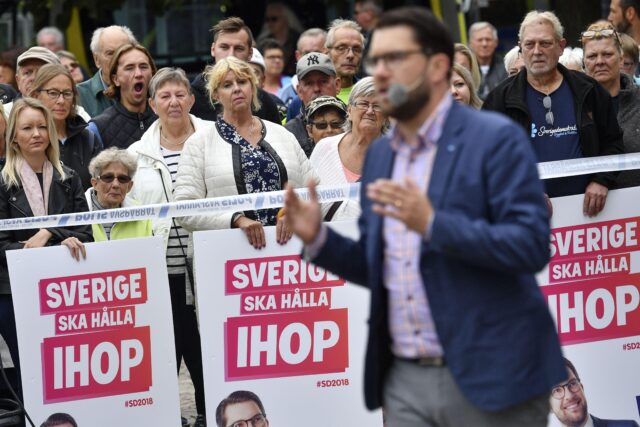
The Sweden Democrats’ (SD) remarkable success in last year’s general election, becoming Sweden’s second-largest party after winning more than 20 percent of the vote, and its rise, have come while other parties have stagnated. The results alarmed the left, which predictably saw them as the vanguard of an authoritarian, ultra-nationalist, neo-fascist backlash.
The View From the Left
Indeed, there is no doubt that the party’s neo-Nazi past cannot be forgotten or forgiven. Writing in The New York Times, novelist Elisabeth Asbrink declared, “As a liberal democrat I will never approve of a party that celebrates its success with references to Hitler’s Nazi ideology.” Her evidence was a 27-year-old SD member’s exuberant exclamation “helg seger,” which in Swedish means “weekend victory.” Asbrink, however, stated, “It’s the sound: One letter away from ‘hell seger,’ the Swedish translation of the Nazi salute ‘sieg heil’ and the war cry of Swedish Nazis for decades.”
Asbrink dismissed the SD’s aggressive efforts over the past two decades to purge its extremist wing. For example, in 2001, the party’s most extreme faction was expelled, leading to the formation of the more radical National Democrats. The purge continued through the 2000s, with the ousting of extremist members, banning both foreign and Swedish extreme-right activists from membership and party events and revisions to the SD’s policy platform. That’s all show, Asbrink contended. In fact, she wrote, “The Swedish far-right has profited from the country’s growing inequalities, fostering an obsession with crime and an antipathy to migrants.”
Asbrink’s opinion echoed Gothenburg University professor Andrej Kokkonen’s comments in The Washington Post, quoted by writer Ishaan Tharoor, that SD members “channel social unrest to their advantage by reheating identities of race, religion and ethnicity, and retailing myths of national greatness.” And it’s working. Anders Borg, Sweden’s former finance minister, regretfully admitted to The Post that accommodation with the far-right is now the only “viable election strategy.”
Tharoor concluded, “That is the narrative surrounding other ascendant far-right parties in Europe, including [Giorgia] Meloni’s Brothers of Italy. Meloni angrily rejects accusations of fascism and has cast herself as part of the political mainstream—cooling her Euro-skepticism, supporting sanctions against Russia and prioritizing, at least for now, economic relief for Italians over a hysterical culture war.”
Crime as a Factor
But The Post and The Times could have turned, as Swedish daily Dagens Nyheter did, to another Gothenburg professor, Henrik Ekengren Oscarsson, who tends to cite actual facts. According to Oscarsson, polls held on the eve of the election showed that a whopping 41 percent of those surveyed said that law and order is the most important issue in Swedish society. This is not a surprise. On Aug. 22, 2022, an article by Peder Jensen published by the Gatestone Institute noted the tectonic effect of “a wave of violent crime that is unprecedented in modern Scandinavian history. For the first time, crime tops the list of voters’ most important concerns in the run-up to the elections.” A few days earlier, even the BBC admitted that “Sweden has one of the highest rates of gun killings in Europe.
“In just two generations,” wrote Jensen, “Sweden went from being one of the safest countries in the world to being one of the most dangerous countries in Europe.” He cited political scientist Patrik Öhberg saying, “This is the first election campaign in modern times where [crime is] so high up on the agenda that all parties, whether they want to or not, have to discuss the issue.” Jensen reflected, “This could benefit the Moderate Party, the Christian Democrats or the Sweden Democrats. On the other side of the political spectrum, it could be detrimental to the Left Party, the Greens and the ruling Social Democrats.”
Why? Because for years, the Swedish left has been unwilling to address the complex reasons behind the skyrocketing crime rate.
Importing Antisemitism
The conspiracy of silence and complicity surrounding this collapse of law and order in Sweden also exists on the issue of antisemitism. “In recent years,” distinguished Israeli scholar Manfred Gerstenfeld wrote, “Sweden has taken in the highest number of migrants in western Europe as a percentage of population. Most immigrants come from Muslim countries where societies are permeated by extreme antisemitic prejudices. The authorities there promote Jew-hatred as national policy.” He put it bluntly, “Sweden can thus be characterized as a major importer of antisemites out of humanitarian motives. But antisemitism in Sweden is not limited to Muslims and neo-Nazis.”
This has been the case for decades. “The country’s best known postwar prime minister, the Social Democrat Olof Palme, was one of the very few leaders of a democratic country to openly compare Israel’s acts to those of the Nazis,” Gerstenfeld noted. True to her party’s tradition, in 2018, Social Democratic Foreign Minister Margot Wallström asked for an investigation into the killing of terrorists by Israel. That she made no such request of any other country goes without saying.
But what do Jews themselves have to say? Unlike in the US, ethnic identities are not noted in Swedish polls, so we do not know how Swedish Jews vote. We have to ask them directly.
A Jewish View
I did so and received a thorough response from my old friend Peter Stein, a prominent Jewish economist.
After he noted that “many, especially on the left and center-left, have tried to invoke Jews in their agenda by using them as shields in their campaign against the Sweden Democrats when pointing to that party’s neo-Nazi past,” he explained that the truth “is much more complex and multifaceted. There are indeed many Jews who are afraid of the Sweden Democrats and see their rise and the electorate’s acceptance of that party as a sign that vigilance towards neo-Nazism and antisemitism is eroded even within the mainstream. But there are other legitimate opinions as well.”
“Many Jews would point out that the biggest threat to Jewish life in Sweden has been in the city of Malmö, which has long been a Social Democratic stronghold,” he pointed out. “It took a long time before the Social Democrats admitted the existence of left-wing antisemitism within their own ranks or the threat posed against Jews by Islamist activists, mainly by people with roots in the Middle East.”
Not all its members have abandoned the Islamists – notably Malmö’s member of parliament Jamal El-Haj, who has Palestinian roots. But fellow-parliamentarian Nima Gholam Ali Pour has castigated the continuing dependence of the Social Democrats on Arab votes which accounts for El-Haj’s participation in the European Palestinian Conference held in Malmö in May – implicitly ignoring the Conference’s known connection with Hamas. Yet Ali Pour concedes that several MPs from Sweden’s Green Party, Left Party and Social Democratic Party had also been scheduled to attend. And while they eventually withdrew, one by one, they did so “notably, without distancing themselves from Hamas.” This despite Hamas’s classification as a terrorist organization within the European Union and therefore inside Sweden.
Small wonder that, according to Stein, “many Jews are not afraid of the Sweden Democrats because of the party’s strong pro-Israel platform and the fact that it was long seen as among the few that spoke up against antisemitism originating from Islamist extremism.”
Like most Swedish citizens, Jews have finally had enough of obfuscation and gaslighting.
The Battle of “Narratives”
The reasons are best explained by former Left Party member Claes Wallenius: Swedish politics have been reduced to a battle over “narratives.” By attacking the motives of the opposition, the pusillanimous establishment has managed to avoid addressing the country’s problems head-on. Wallenius’s diagnosis is worth noting, not only for the lessons it offers to Sweden but to progressives around the world and particularly in the US.
Writing in the Oct. 1, 2022 issue of Dagens Nyheter, Wallenius recounted his personal experience, saying, “I myself served on the Left Party’s party board from 2008-2012. At that time, the party’s communicators had been on a course. There they had learned that it must formulate its ‘story.’ And in our ‘story,’ immigration would not be described as a problem… We would not endorse the SD’s ‘problem description’ and we would not ‘normalize’ the SD by inviting them to any debate at all,” he explained. “Politics was thus reduced to a struggle between different ‘narratives,’ with a party or movement being advised to avoid talking about issues where it did not have popular or easy answers. The ‘narrative’ became the important thing—not the reality.”
Wallenius is anything but anti-immigrant. “The group we call ‘immigrants’ is a very heterogeneous group,” he said. “They differ from one another in many ways. They have different countries of origin. They have migrated for different reasons. They come from different social classes, have different levels of education and so on. So, there is not one truth about the immigrant. There are many.”
The Results
The truth is that the effects of immigration have also been mixed—some good, some bad, and some very bad indeed. Changing the terms of the debate is a tall order. Over half-a-century, “liberalism” has mutated from its classical and Hebraic origins to its opposite: progressive statism. At the same time, the libels “fascist” and “Nazi” are routinely hurled against Israel and the US, thanks largely to Soviet-era disinformation long embraced by the left and its Islamist fellow travelers. But narratives can only go so far. Eventually, reality asserts itself through the fog of spin.
For at the same time as the European Palestinian Conference was spewing its antisemitic venom, Israeli Foreign Minister Eli Cohen was visiting Stockholm. It was the first such visit by Israel’s top diplomat. And members of the Swedish Democrats made an unofficial visit to Jerusalem, “seeking to build friendships with the Jewish state.” On August 28, Prime Minister Benjamin Netanyahu met with a delegation of Swedish parliamentarians from the Christian Democratic party with these words: “I am glad to see there is a change in Swedish policy.” The meeting focused both on the ongoing struggle against antisemitism and on plans for increased cooperation between the two countries on technology and artificial intelligence.
Added Netanyahu: “This is an important beginning.” Perhaps it is also a major turning point for Sweden and perhaps – one can only hope – for Europe itself. B’ezrat HaShem – God willing.
Juliana Geran Pilon is a senior fellow at the Alexander Hamilton Institute for the Study of Western Civilization. Her latest book is An Idea Betrayed: Jews, Liberalism and the American Left. She has taught at the National Defense University, the Institute of World Politics, American University, St. Mary’s College of Maryland, and George Washington University.





